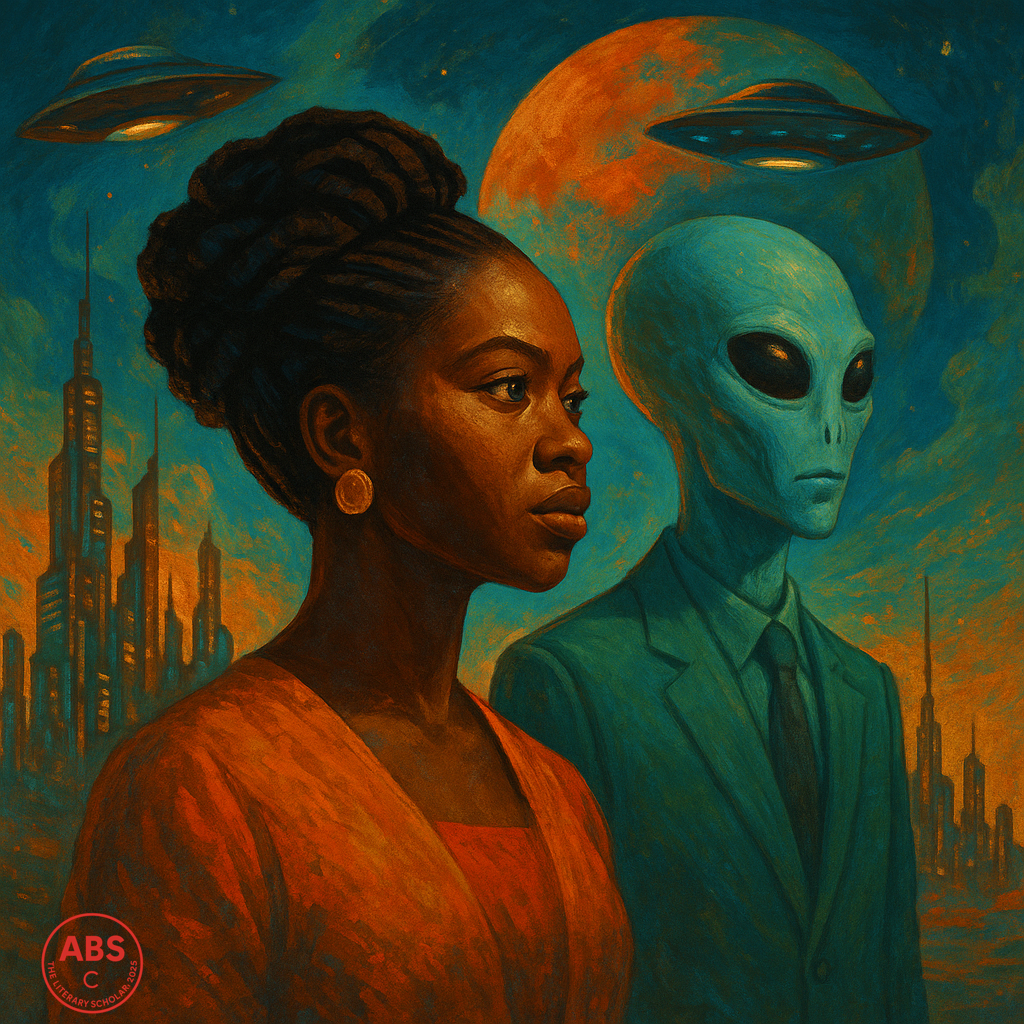Sci-fi, Surrealism, and Why African Writers Are Lightyears Ahead of Western Tropes
From ABS, Who Believes that the future is African—and the spaceship runs on ancestral memory and sass.
In most Western science fiction, the future looks suspiciously like Silicon Valley in space—clean, white, metallic, and somehow still obsessed with AI having feelings.
But in Afrofuturism? The future has drums, dialects, deities, and dysfunction.
Also: aliens, ancestral spirits, malfunctioning governments, and a few time travelers who forgot their visas.
Welcome to African speculative fiction—where past, present, and future dance in a circle, wearing gold-plated headwraps and solar-powered sass.
Afrofuturism Is Not Just Sci-Fi in Ankara Print
Let’s be clear: Afrofuturism is not just “Black Panther” aesthetics with an Ubuntu logo. It’s a literary movement that blends African cosmology, history, mythology, political commentary, and technology to imagine futures untainted by colonizers—or shaped by their ruins.
It’s not escapism. It’s reclamation through reimagination.
Nnedi Okorafor: The Queen of African Sci-Fi (and Anti-Colonial Robots)
If African speculative fiction had a high-tech throne, Nnedi Okorafor would be sitting on it—with a neural implant and a machete.
Her Binti trilogy features a Himba girl who leaves her Earth-based tribe to study at an intergalactic university, only to get caught in an alien war. Think Octavia Butler meets Nollywood in hyperspace.
Okorafor doesn’t just create new worlds—she Africanizes the cosmos.
Her stories respect tradition while rewriting it, infusing tribal customs into space tech, and turning spiritual intuition into interstellar logic.
Lagoon imagines aliens landing in Lagos (because where else would they go?), while Who Fears Death mixes post-apocalyptic wastelands with ancestral magic and genocide commentary.
Okorafor calls her genre Africanfuturism—emphatically rooted in Africa, not just Blackness. And yes, her worlds are weirder than Elon Musk’s Mars colony dreams—and far more intelligent.
Ben Okri: The Spirit-Child Who Time-Traveled from a Poem
While Western speculative fiction worries about killer robots, Ben Okri asks: “What if spirits dream, too?”
His The Famished Road won the Booker Prize by blurring every line—between death and life, realism and vision, revolution and hallucination.
His protagonist, Azaro, is a spirit-child who straddles multiple dimensions in a chaotic Nigerian city full of political corruption and supernatural noise.
Okri’s futures are fluid. He doesn’t believe in linear time. And honestly, neither does bureaucracy in most postcolonial states.
In Starbook, he blends myth and metaphysics, in a kingdom that feels both eternal and expired.
Okri’s fiction isn’t easy—but it’s existentially electric.
Kojo Laing: Bureaucrats, Banjos, and Beautiful Nonsense
Ghanaian writer Kojo Laing is the surrealist Afrofuturist no one talks about enough—possibly because his novels make James Joyce look like a recipe book.
In Woman of the Aeroplanes and Major Gentl and the Achimota Wars, Laing invents entire languages, plots that defy logic, and characters who may be metaphors or molecules.
He turns colonial hangovers into bureaucratic nightmares. His villains include corporate empires that dissolve culture into data. His heroes wear idioms like armor.
Laing’s future is chaotic, carnivalesque, and deliberately incomprehensible to colonizers.
He wrote like the world had already ended—and language was rebuilding it with a giggle.
Tade Thompson: Neuroscience and Yoruba Cyberpunk
With Rosewater, Tade Thompson exploded onto the speculative scene. His alien-invasion trilogy is set in Nigeria, features psychic sensitives, fungal extraterrestrials, rogue AI, and government conspiracies—basically everything dystopia fans love, plus jollof.
A neuroscientist by training, Thompson grounds his science fiction in realism—but never abandons Yoruba cultural underpinnings.
His characters don’t just hack systems—they question whose system they’re even inside.
Thompson writes with cool precision and quiet rebellion. His futures are wired with both tech and trauma.
Mohale Mashigo: Short Stories with Long Shadows
South African writer Mohale Mashigo brings Afrofuturism to the everyday. In Intruders, her characters time-travel through trauma, glitch out of capitalism, or negotiate with spirits in Wi-Fi cafés.
Mashigo is part of a younger wave of writers who don’t need to “prove” Afrofuturism’s legitimacy. They live it.
For them, Black futures are not hypothetical—they’re here, weird, and worth writing about.
Afrosurrealism, Afrospiritualism, AfroEverything
Beyond novels, African speculative fiction is thriving in short stories, zines, graphic novels, and performance:
Sheree Renée Thomas, Wole Talabi, and Dilman Dila craft stories where time folds like origami.
Tochi Onyebuchi writes about African-American surveillance states and exorcisms.
AfroSF anthologies gather African sci-fi voices like a literary Wakanda with word processors.
This movement doesn’t just imagine the future. It shames existing ones.
Not Escaping, Reclaiming
Western sci-fi often dreams of escaping Earth.
African sci-fi dreams of reclaiming it—its history, its damage, its dreams.
Here, decolonization is not an academic term. It’s a portal.
A writer presses a key. A world opens.
Somewhere between the griot and the astronaut, the sacred and the simulated, Africa isn’t just catching up to sci-fi.
It’s rewriting the genre’s DNA.
ABS scrolls through a galaxy woven with ancestral code.
No laser beams—just languages, deities, hackers, and the laughter of those who’ve already survived the apocalypse.
The future isn’t a destination. It’s a return—with upgrades.

Signed,
ABS
The Literary Scholar who believes that the ancestors never left—they just changed frequencies.
And that the most radical science fiction is written in a language your colonizer can’t pronounce.

Share this post / Spread the witty word / Let the echo wander / Bookmark the brilliance
